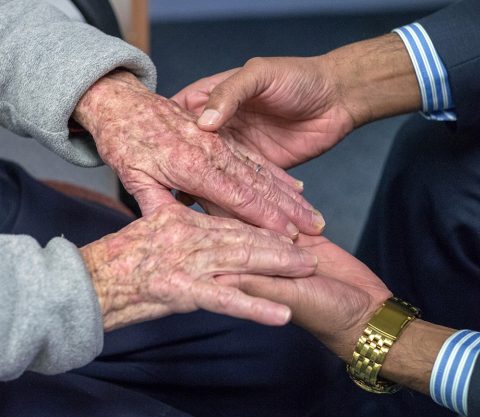Janet Daglish quietly led a double life for years before it became obvious to her colleagues. “I started answering work emails at 3 a.m. and was constantly stepping out to respond to family emergencies,” she says. Finally, she gave up trying to hide the increasing demands of looking after her father – who had cancer, chronic heart problems and diabetes before his death in 2015 – and her mother, who has dementia. Fortunately, the health-care organization where she works offered flextime so she could juggle her responsibilities as an employee and caregiver, as well as a parent of three sons. Still, it was gruelling. Daglish (BA 1984 Victoria) and her brother, Richard Payne (BSc 1983 Trinity), struggled with the relentless, wide-ranging tasks, from administering medications and giving baths to co-ordinating with doctors and pharmacists. “I underestimated the stress we were under at the height of it,” she says. “It started to affect our health.”
Daglish and Payne are among the more than eight million Canadians who provide unpaid care for sick, injured or aging family or friends. As the population gets older, the number of caregivers will increase – and so will their importance in society. They already provide 80 per cent of all senior care in Canada.
This contribution can come at a steep personal cost. Though some people find caregiving rewarding, the sheer 24-7 nature of it causes many to develop a range of physical and mental health problems.1 Then there’s the financial loss: close to 30 per cent of workers with parents over 65 sacrifice about 450 working hours each year on top of out-of-pocket expenses averaging $3,300 per year.
By documenting these adverse effects and exploring ways to mitigate them, University of Toronto researchers such as Dr. Nathan Stall and Prof. Jill Cameron are encouraging policy-makers and health-care professionals to better support those who minister to friends and family members. Because when caregivers wear out or need care themselves, the repercussions are enormous and expensive. (They already save Canada’s health-care system an estimated $24 billion to $31 billion annually.)
“We often consider what caregivers do to be a natural extension of their family roles,” says Stall, a PhD student at U of T’s Institute of Health Policy, Management and Evaluation. He decided to study caregiving after seeing the heavy toll looking after his grandfather with dementia took on his grandmother. “With some older adults, and particularly often with spouses, there’s a certain stoicism and resistance to accepting outside help.”
The expectation that family members will step up is especially common for women, who provide most caregiving in Canada, notes Stall, who is also a geriatrician at Mount Sinai Hospital in Toronto. In his research, he found wives and daughters provide two-thirds of dementia care. Now he’s investigating how a caregiver’s gender affects the person with dementia, and if there are ways to give more men the skills and confidence to take on that role.
“As clinicians, we’re generally not taught to ask if people are willing or able to be caregivers in the first place – or if they become burnt out later on,” says Stall. He and Cameron both believe that all health professionals’ training should include education on caregivers’ challenges and guidance on how to help them.

For Clayo Laanemets (BKin 2014, MPH 2017), the strain of caregiving came at an earlier life stage than for Daglish. Ten years ago, she was a first-year student living in residence when she learned that a loved one was behaving strangely. Later, she discovered her loved one had been diagnosed with a serious mental illness and was having a psychotic episode. “My world turned upside down,” says Laanemets, who has requested that the person remain anonymous. “I moved back out of residence and became the primary caregiver. I also got a full-time job to pay the bills – all while still attending classes. I felt so isolated, and I started having my own mental health problems.”
Tending to someone with dementia can be similar to a chronic stress experience, says Stall. It has severe and long-term health consequences and can even lead to increased mortality. “To make matters worse, caregiving in general has become more complex. We’re asking people to manage more complicated medical and psychological care and navigate an increasingly fragmented system – all with little to no training.” When caregivers do get education and assistance, they fare better, says Cameron, who is an associate professor in occupational science and occupational therapy.
One of Cameron’s major findings is that caregivers of patients in intensive care units have a high risk of developing depression up to a year after the patients’ discharge. The study, co-led by Professor Margaret Herridge of the department of medicine, also found that sicker patients didn’t necessarily have more depressed caregivers. “Instead, caregivers became depressed when they lacked certain protective factors, including a sense of control, an ability to carry on with their everyday lives and social support,” says Cameron.
Laanemets says her partner got her through the toughest times during her own experience as a caregiver. “Even if you have just one person to lean on, it can make a world of a difference.” For caregivers who don’t have built-in networks, Cameron has found that education programs – which teach people how to find community resources, build relationships and use positive coping skills – improve well-being.
The end-game, according to Cameron and Stall, is using research to standardize caregiver support in the health-care system. But first we need to demonstrate that healthier caregivers produce healthier patients at lower costs, says Cameron, who’s working on generating that evidence – as is Stall, who’s already shown that people with dementia who have distressed caregivers are more likely to be institutionalized. One of Stall’s current studies is going further: he’s aiming to calculate the total health system impact of having a distressed caregiver.
In a 2019 editorial in the Canadian Medical Association Journal, Stall stated that the ability to support caregivers is one of Canada’s most pressing health-care and societal issues. He called for more publicly funded home and respite care, access to caregiver-specific education and counselling, flexible workplace policies and needs-based tax relief.
These things can’t come fast enough for those on the frontlines. Nearly half of those tending to friends and family with dementia and mental illness report distress, according to a recent Ontario Caregivers Organization survey, and almost 60 per cent of all caregivers say it’s hard to find help. “Part of my job focuses on home care, yet even I struggled to access the right services for my parents,” says Daglish.
Laanemets spent three frustrating, lonely years seeking assistance for her loved one. “I was reaching out for help, but wasn’t receiving any,” she says. Now she’s using her expertise in public health to make it easier for other caregivers by creating ConnectingMINDS, Canada’s first online hub for families affected by psychosis. Funded in part by the University of Toronto’s Healthy Generation Fund, it will allow caregivers to connect and share practical information. Eventually, she hopes the platform will expand to include other mental illnesses and be fully integrated in the mental-health-care system. Says Laanemets: “I’ve found my purpose and passion – to make change so that others never have to go through what I did.”
Recent Posts
People Worry That AI Will Replace Workers. But It Could Make Some More Productive
These scholars say artificial intelligence could help reduce income inequality
A Sentinel for Global Health
AI is promising a better – and faster – way to monitor the world for emerging medical threats
The Age of Deception
AI is generating a disinformation arms race. The window to stop it may be closing






One Response to “ Who Cares for the Caregivers? ”
We have much work to do for caregivers. I am a full-time caregiver for my 98-year-old mother with advanced dementia. I've cried for help for last 12 years. The more I ask for help, the more I feel isolated.